- Home
- Chris Ryan
The Kremlin Device Page 10
The Kremlin Device Read online
Page 10
Seeing Rick frown, he added in a patronising voice, "I wouldn't worry about it. You can take it from me that it'll be OK. I could go into a more technical explanation, but I don't think you'd understand. The bottom line is that the satellite sends signals down, and the SCR only answers for a split-second every twenty-four hours."
He looked round the row of faces, clearly enjoying his role of teacher.
"For security when the devices are being moved around," he went on, 'there's this very useful piece of equipment."
He crossed to the end of the small case marked A-R and applied his thumb to a shallow depression near one corner. The sprung lid of a small compartment flew open, and from it he took out an object the size of a compact mobile phone.
"This is the radio alarm trigger, generally known as the Rat. Whenever this is switched on it has to remain within thirty metres of the device. If it goes farther away than that it automatically triggers a radio alarm in the device itself. The signal can be picked up by satellite. So if you have to move the device in enemy territory, I suggest that the guy in charge keeps the Rat on his belt like this."
He clipped the thing on to his own belt, then returned it to its lair.
"What about having a shufti inside one of the components?" I suggested.
"Not a chance." Toad started dry-washing his hands again.
"They're all sealed down, and I don't want to break them out until they're about to be put in position. There are quite a few checks I'll have to make then."
We couldn't argue with him and he knew it. He wouldn't even come clean about the damage each bomb was likely to do.
He pretended the information was classified and kept it to himself. We had to be content with staring at diagrams of bewildering complexity which he brought up on a lap-top from his own CD. We all knew, though, that the destructive capacity packed into the black boxes in front of us was something awesome.
"What would happen if we got the devices in position but didn't prime them properly?" I asked.
"What if you deliberately connected them up wrong?"
"The satellite would detect the fault. That's the beauty of the system. The Pentagon would know there was something wrong.
They'd probably send us back to put it right."
"Well," said Pavarotti, as if to sum up.
"I'm not going down any fucking tunnel. That's for certain."
"I wouldn't be so sure," I told him.
Our 'last-minute' checks seemed endless. We were taking our own main weapons and ammunition MP5s and G3s so that we could give demonstrations without having to worry about handling unfamiliar kit. Stun grenades for CQB work; plastic explosive, detonators and det cord for EMOE. Also, I'd cleared it with Sasha that we could take pistols, to carry covertly when we were outside the camp. With crime running at the level it was, he'd agreed that it would be only sensible to have some means of self-defence.
Covert com ms equipment was another basic item we'd need for demonstrations. Also, I foresaw that it would be indispensable when it came to recceing sites for Apple and Orange and then inserting the devices. Plenty of batteries were required, therefore, and recharging kit. For work in the tunnel we needed good head-torches, short-handled picks and jemmies, plus a wire climbing ladder for going down the access shaft, and lightweight pulleys and nets for lowering the component parts of Apple. Also sandbags for removing spoil from the insertion-point, lock-picking kit for the padlocks, shovels for possible digging on the Orange site.. . All this on top of our normal equipment and personal kit.
At one point the CO called me in for a private chat.
"Sit down, Geordie," he began.
"I can see you're not happy.
You've just got to make the best of it."
I nodded.
"This mass-destruction it's not like the Regiment.
"I know. But what you've got to believe is that the devices will probably never be used."
"Easy enough to say that. One thing I'd like to be bloody sure of is that they're not going to get used while the team's still over there."
"Don't be stupid. There's no chance of that."
"How do we know? What if the Resident gets assassinated and there's some kind of Mafia takeover? What if Clinton decides that Ri~ssia's going down the tubes and criminals are about to take over? The international situation might go to rat shit in a few hours."
I stared at the boss, and he said nothing.
"What I'd like to know is, whose finger's going to be on the button? Who's really in charge? If it's the Yanks, I'm not at all happy. They're just as volatile as anyone else. Worse, probably."
The boss gave a non-comirnittal grunt, and I went on, "It's bloody two-faced of our own government, anyway. All these overtures to the Kremlin about giving them help and now this."
"That's politics for you."
There was no good counter to that, and I came away feeling pretty pissed off Thinking ahead, I put in a call over the secure satellite link to the Charge d'Affaires in Moscow. He sounded friendly enough, to the point of asking if there was anything he could do to help.
"Well, thanks," I said.
"We're coming in tomorrow night, as planned, but we don't start the course till Monday so I wondered if we could bring some kit to store in the cellar on Sunday evening?"
"Ah." He sounded a bit taken aback.
"I shall't be here. But I tell you what. I'll leave the keys with the duty officer. That's going to be.. . wait a minute... Richard Henshaw. I'll tell him to expect you. What time will you get here?"
I had to think fast.
"I'm not certain we'll have transport by then. But let's assume we will have. We should be there between six and seven in the evening. If there's anything different, I'll call to say so.
"Right-oh. I'll leave a message at the gate."
So far, so good. Then, to take my mind off immediate problems, I called Tony Lopez, late of the US SEAL. special forces, but by now working in CIA headquarters at Langley, Virginia. I had come to know Tony after he'd rescued me when I got hurt in Iraq during the Gulf War and we'd been interned together for a month. Then, a couple of years later, he had come over for a tour with the Regiment, and had done brilliantly until he'd had his left arm smashed.
His wound was serious enough to finish his career in the armed forces, and when he'd recovered, he joined the CIA. He'd been too discreet to tell me exactly what areas he was working in, but it didn't take a genius to guess that he would have responsibility for special forces projects.
Now, when I got through, he sounded his usual lively self.
"Hi, Tony," I went.
"How are you doing?"
"Good! Good! How about you?"
"Fine. How's the arm?"
"Still improving. About seventy percent now.
"Great. Listen, Tony d'you know people in the Drug Enforcement Agency?"
"Sure do. Why?"
I told him about Rick's friend Natasha, and her sister Irma who'd got sucked into the Russian Mafia operations in New York. I also gave him the name of the brasserie in Brooklyn where the girl was supposed to be working, and asked if he could do anything to help.
He said he'd put in a call to a friend in the DEA, but then in a different voice he added, "So it's you who's been in Moscow. I might have guessed."
"What's that supposed to mean?"
"Nothing. But this assignment could be a hot number. When you go back there, Geordie, take it easy. OK?"
"OK." I wasn't going to ask him anything else. Clearly Tony knew about Operation Nimrod: he knew we'd been over, he knew we were going back... and there were obviously things about the task that he didn't like.
SIX.
The runway at Balashika was pretty short, and the captain of the aircraft warned us in advance that he'd have to do a tactical landing. In practice that meant that he banged the Here down so hard on the first impact that it bounced and flew on a bit before coming to earth a second time. Down in the back we all had a good grip o
f the cargo nets, and although we went weightless for a second or two, with legs and bodies flying up in the air, we were none the worse.
When the tailgate opened the night air struck surprisingly cool.
Sasha was there to greet us, and as we shook hands I remarked on how cold it was.
"I told you," he said.
"Summer is feenished."
But the temperature was good for unloading and, in spite of numerous well-meaning offers of help from waiting Russians, we insisted on humping all our own kit ourselves.
"It's kind of you to have kept them up," I told Sasha, 'but we can handle this. Let them go to bed."
We had everything out on the apron within forty minutes, and as the Here took off for home I watched its navigation lights disappearing into the sky with the same feeling I'd had when I'd looked at the head lo adie before we went out on the HALO jump over France: Lucky bastards, I thought. They're off home. A nice, comfortable stop-over in Berlin, and tomorrow they'll be back.
We, meanwhile, were left two thousand miles from base with fearful problems to solve.
As soon as I saw we had everything up together, I insisted that Sasha fall out. I knew he had a room in the officers' mess on the camp, but he'd told me that at weekends he went home to live with his mother in her flat in Ostankino, a northern suburb of Moscow. At that time of night, he said, it was only fifteen minutes by car so off he went, with promises to be back first thing in the morning.
The important stuff was locked inside green boxes, stencilled with white numbers 1 to 27. We never let any of these boxes out of our sight. We lifted them on to hand-trolleys, wheeled them across to our designated block, and carried them up the steps ourselves. I was glad to find that Sasha had got strong hasps and padlocks organised on most of the doors, and I designated two rooms at the end of the corridor as stores, next to the kitchen on one side and the signal office on the other.
By 2:00 a.m. local time we had everything squared away. The cooking equipment was in the kitchen and the edible stores in the room alongside. We designated the best-protected room the armoury, putting the weapons, ammunition and CND components in there. The room next to that had the only telephone, so we made that our office and com ms centre, housing (among other things) the lock able filing cabinets we'd brought to contain the classified CDs. I created an instant rule that all lap-tops were to remain in the office, unless being used for giving lessons, and that no Russian was allowed in there on any pretext.
As for sleeping, we billeted ourselves in twos. Whinger and I shared, with the rest of the team similarly paired off. Coarse sheets and blankets had been dumped on the beds, and the water in the showers was hot. A smell of fresh emulsion paint, not unpleasant, made it clear that some hasty sprucing-up had taken place. Mal nearly went ballistic when he saw a rat disappear down a hole in the corner of the corridor, but I told him to push a Lacon box over the place and we'd deal with it in the morning.
The odd man out was Toad, whom I'd detailed to sleep with his devices in the armoury. In fact I'd told him that as long as the CNDs remained in camp, he was to stay with them day and night, except when relieved by somebody approved by me. I also told him he'd got to screw the nut and knock his running on the head for the time being, even if it meant him going short of exercise. In sum, he was to guard his charges with his life, until such time as we could transfer them to the safety of the Embassy cellar.
For our nefarious purposes, the block was brilliantly placed. It backed directly on to the edge of the training area, with no other buildings behind it, and nobody overlooking its rear entrance.
Our people would be able to slip out that way, straight down a track and into the scrubby forest. Also behind the block was parking space for several cars, so we'd have little bother loading the CND components into vehicles for transport to the Embassy.
When I realised how well sited we were, I almost changed my mind about the need to move the devices: in such favourable circumstances I thought hard about keeping Orange with us.
Then I reckoned, No: I don't fancy being out of the building all day, running the course, with those things sitting here even if Toad is in charge. Better get both of them into the Embassy until we're set up to deploy them. Thus I decided that we wouldn't wait, but would follow my original plan and move them on Sunday evening. For one thing, they'd be gone before Anna came on the scene, at 8:30 on Monday morning; and for another, I already knew from our first visit that the Moscow traffic was far lighter during the weekend than on working days.
It wasn't long before I felt sure I'd made the right decision.
With the course not due to start until Monday morning, we had all Sunday to sort ourselves out; but we'd hardly got a scratch breakfast down our necks when Steve, one of the scalies, came up to me with a face of doom and asked if he could have a word. When I asked what the problem was he jerked his head up and back, meaning, Let's go outside. So we walked out the back, into the edge of the forest, and he said, "Geordie, they've put bugs in the power points."
"Where?"
"In the signals room, and in the kitchen."
"Ah, shite! Are you sure?"
"Hundred percent. I was making a routine sweep, and they came up loud and clear. Have a listen for yourself."
Back inside, I borrowed Steve's detector kit and ran the sensor pad along the wall in the signals room. As it passed the dual power-point, a loud brrraannggg sounded in the headphones, then died away as I moved the pad on. I said nothing, but shook my head, went through to the next room, and got the same thing.
What should I do? Report the bugs to Anna in the morning?
Have a quiet word with Sasha? Say nothing?
In the open again, walking up and down, I asked Steve if he could disable the microphones without his interference being apparent.
"I suppose if I knocked one out, they might think it had just broken down. But WI did both they'd be bound to realise."
"OK, then. Knacker the one in the signals office. Break one of the connections or whatever you have to do, but leave the other.
Have you swept the signals room thoroughly?"
He nodded.
"There's only the one in there."
"Better do all the rooms the same.
Now I realised why our hosts had done so much redecorating:
they'd painted over any bits of re plastering that had been needed.
The discovery unsettled me.
"I'm really disappointed," I told Whinger.
"I hoped all that was a thing of the past."
"Who are we to talk?" he said.
The truth of his remark kept me in a state of permanent unease. I confirmed to Whinger that I didn't intend to mention the bugs: we'd wait to see what happened if Steve took one out.
The day being Sunday, there were few people about on the camp, and we were left to sort ourselves out which suited us fine. There was more than enough admin and physical work to keep us busy. Sasha was in and out, making sure we had all we wanted.
It was clear that all our lads were going to have to take turns at cooking, and in mid-morning Sasha took Dusty our master chef and Mal off on a conducted tour of Balashika's shops, from which they returned effing and blinding. The so-called
Supermagazin was a disaster, and the only place they found any half-decent vegetables was in an open-air market, where locals were selling produce brought in from the country. In the Supermagazin they'd bought scabby oranges, and at the other place they had got eggs, onions, carrots, cabbages and potatoes;
but still it looked as though we were going to be relying heavily on tins, packets and boil-in-the-bag meals designed for use in the field.
After lunch, under Sasha's supervision, drivers delivered two battered-looking Volgas, one mid-grey, one black, with worn tyres and rust showing through the paint where the mudguards joined the body. He explained that they were a slightly later model than his own, but similar. The grey one had 88,000 ks on the clock, the black 13,000 which obviou
sly meant that it had been round the dial once at least When I asked if it was OK to drive around the dirt roads inside the training area, to familia rise ourselves with the vehicles, Sasha exclaimed, "Why not?"
"How about going into town?"
"Whatever you like. You've got your licences OK. But inside camp, no red-and-white bars, please."
He meant that we weren't to go through any of the safety barriers that blocked off the danger areas; but there was plenty of other space, and four of us set out for a spin. Before we left, I got Steve to run his bug-hunter over both vehicles just in case, but the result was negative, and that reassured me a little.
Nevertheless, we didn't propose to run unnecessary risks, so we took covert radios and kept the Volgas a few hundred metres apart, chatting to make sure we weren't being followed.
The cars were sluggish and noisy, with heavy steering; but even though driving them was a pain, at least we had wheels of our own. I hadn't expected such freedom: I'd imagined we would be more closely supervised. The entire training area was ringed by the concrete wall, so we were in fact enclosed. We soon found that a perimeter track skirted the inside of the wall, heading out north-eastwards in the direction of the space complex; and after a couple of ks we began to see, beyond the wall, amazingly large, white dish-aerials pointing skywards in seined ranks. Although I said nothing, I could immediately imagine why the Pentagon fancied taking that lot out.
The land was almost dead flat, with only a gentle rise and fall to relieve the monotony. Patches of pine and birch forest alternated with wide-open scrub and grass, crisscrossed by dirt tracks, reminding me of the training areas at Pirbright. Here and there a primitive wooden observation tower stuck up above the trees. Clearly the training area was well used, but two things about it made me feel reasonably secure. One was the sheer size of the landscape. In terrain as open as this it would be very difficult for anyone to watch us without our being aware of the surveillance. The other factor in our favour was the decrepit nature of the fixtures and fittings. On several of the wooden watch-towers the ladders had rungs missing, and the red-and white bafflers which Sasha had mentioned were bent and rusting. All this, we felt certain, reflected the cut-down in the Russian forces: clearly, they had nobody to do the maintenance and were generally short-staffed.

 Global Strike
Global Strike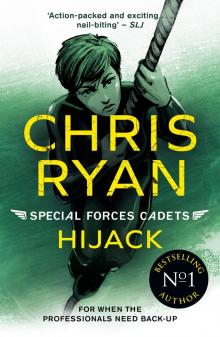 Hijack
Hijack Special Forces Cadets 2
Special Forces Cadets 2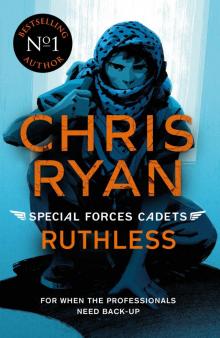 Ruthless
Ruthless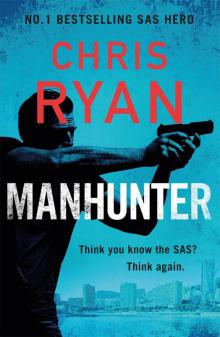 Manhunter
Manhunter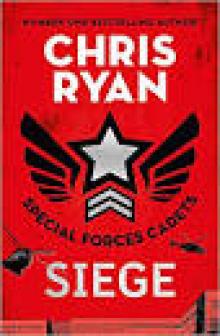 Special Forces Cadets 1
Special Forces Cadets 1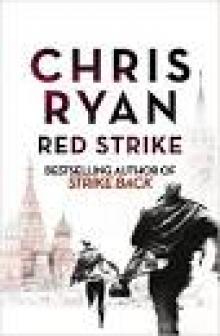 Red Strike
Red Strike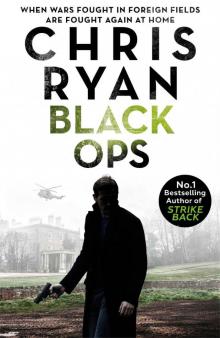 Black Ops
Black Ops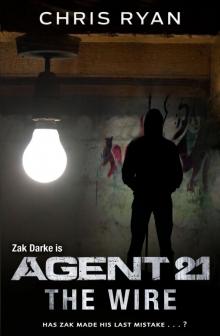 Agent 21: The Wire
Agent 21: The Wire Land of Fire
Land of Fire Alpha Force: Fault Line
Alpha Force: Fault Line Under Cover (Agent 21)
Under Cover (Agent 21)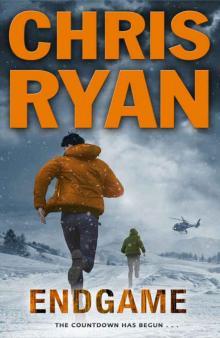 Endgame (Agent 21)
Endgame (Agent 21) Red Centre
Red Centre Blackout
Blackout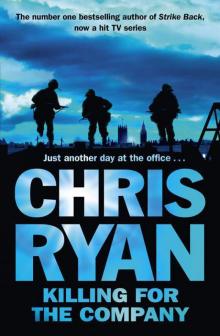 Killing for the Company
Killing for the Company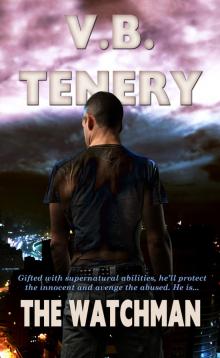 The Watchman
The Watchman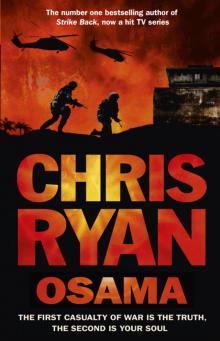 Osama
Osama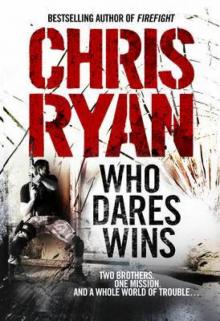 Who Dares Wins
Who Dares Wins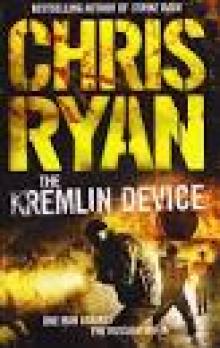 The Kremlin Device
The Kremlin Device Hunter Killer
Hunter Killer Alpha Force: Untouchable
Alpha Force: Untouchable Stand By Stand By
Stand By Stand By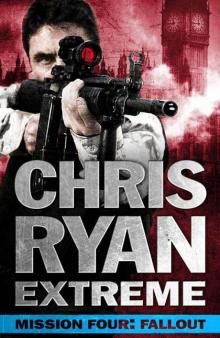 Chris Ryan Extreme: Hard Target: Mission Four: Fallout
Chris Ryan Extreme: Hard Target: Mission Four: Fallout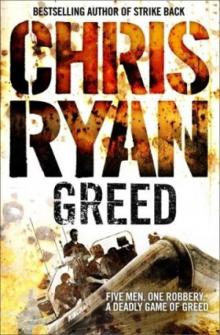 Greed mb-1
Greed mb-1 Alpha Force: Desert Pursuit
Alpha Force: Desert Pursuit Strike Back
Strike Back Greed
Greed The Bay Bulls Standoff
The Bay Bulls Standoff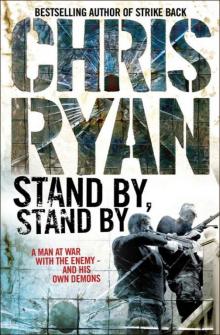 Stand By, Stand By gs-1
Stand By, Stand By gs-1 Outbreak
Outbreak Hunted
Hunted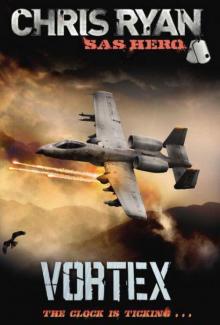 Vortex cr-4
Vortex cr-4 Rat-Catcher
Rat-Catcher Vortex
Vortex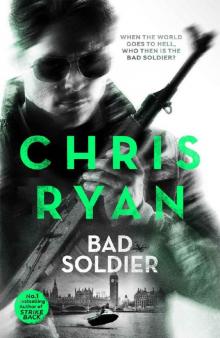 Bad Soldier
Bad Soldier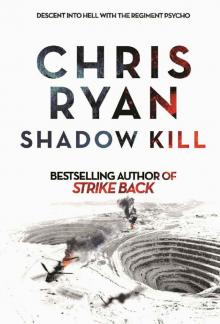 Shadow Kill: A Strikeback Novel
Shadow Kill: A Strikeback Novel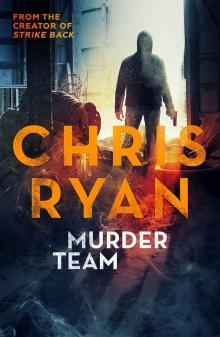 Murder Team (Kindle Single)
Murder Team (Kindle Single) One Good Turn
One Good Turn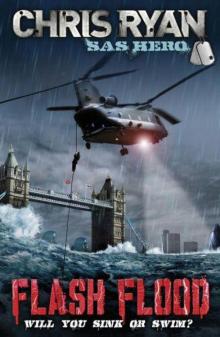 Flash Flood cr-1
Flash Flood cr-1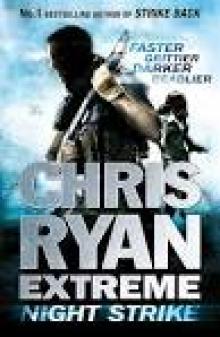 Night Strike
Night Strike Wildfire
Wildfire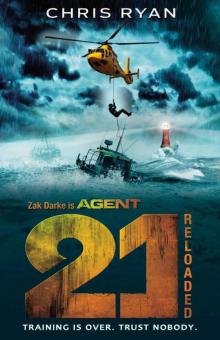 Agent 21: Reloaded: Book 2
Agent 21: Reloaded: Book 2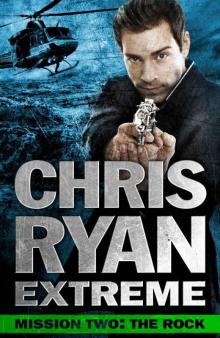 Chris Ryan Extreme: Hard Target: Mission Two: The Rock
Chris Ryan Extreme: Hard Target: Mission Two: The Rock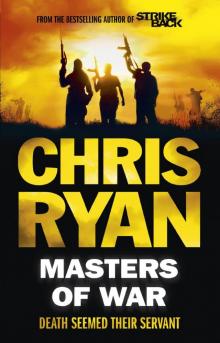 Masters of War
Masters of War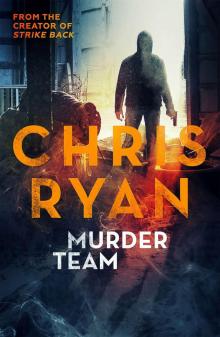 Murder Team
Murder Team War Dog
War Dog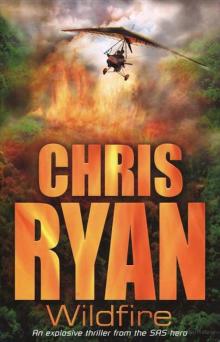 Wildfire cr-2
Wildfire cr-2 Survival
Survival The One That Got Away - Junior edition
The One That Got Away - Junior edition The Hit List
The Hit List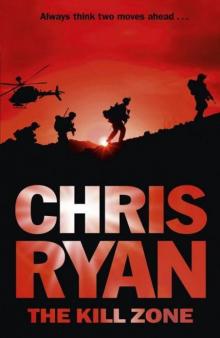 The Kill Zone
The Kill Zone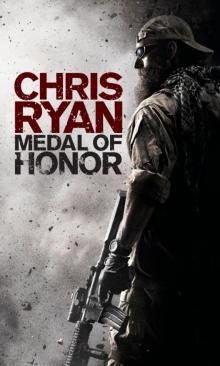 Medal of Honor
Medal of Honor Battleground
Battleground Twister
Twister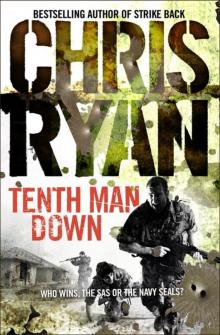 Tenth Man Down gs-4
Tenth Man Down gs-4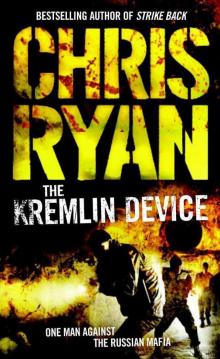 The Kremlin Device gs-3
The Kremlin Device gs-3 Hostage
Hostage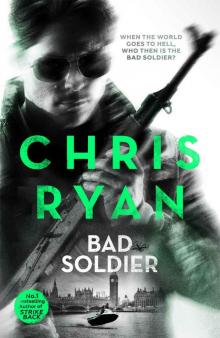 Bad Soldier: Danny Black Thriller 4
Bad Soldier: Danny Black Thriller 4 Alpha Force: Blood Money
Alpha Force: Blood Money Firefight
Firefight Chris Ryan Extreme: Hard Target: Mission One: Redeemer
Chris Ryan Extreme: Hard Target: Mission One: Redeemer Hit List
Hit List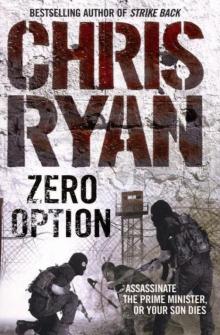 Zero Option gs-2
Zero Option gs-2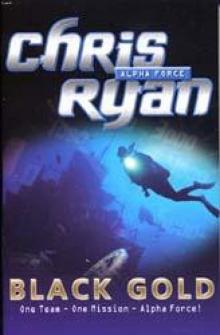 Black Gold
Black Gold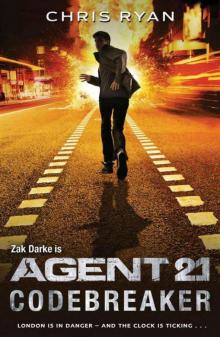 Agent 21: Codebreaker: Book 3
Agent 21: Codebreaker: Book 3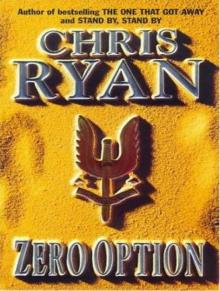 Zero Option
Zero Option Ultimate Weapon
Ultimate Weapon Tenth Man Down
Tenth Man Down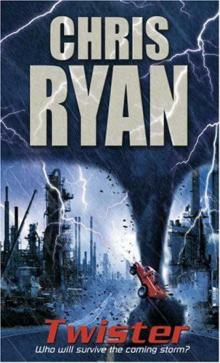 Twister cr-5
Twister cr-5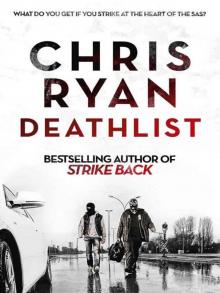 Deathlist
Deathlist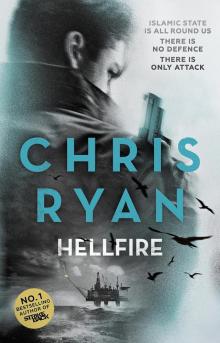 Hellfire
Hellfire Flash Flood
Flash Flood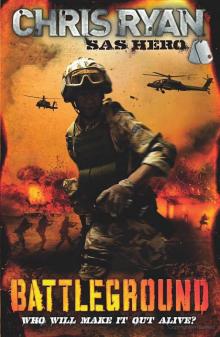 Battleground cr-6
Battleground cr-6 The Increment
The Increment